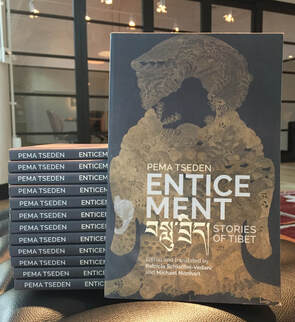Some Guidelines for Khabda Hosts:
Enticement
|
Every local Machik Khabda will be completely unique, and we think that’s exciting. Each of us begins the conversation with our own experiences, background, interests and concerns, and that’s what will shape each local conversation. We’re actually curious how each conversation develops and we’re going to keep encouraging you to share your insights and reflections online.
But just to offer some notes on hosting your Khabda on Enticement, here are some topics and themes you might want to touch on: Literary bilingualism. The stories in Enticement were originally published in both Tibetan and Chinese, which is why there were two co-editors/translators (Patricia Schiaffini-Vedani working on the Chinese stories, Michael Monhart working on the Tibetan stories). We’re happy to let you know that interviews with Patricia and Michael are available online — they share some insights on their experiences as translators for both sides of contemporary Tibetan literature. Stylistic variation. We are featuring the lead story, Orgyan’s Teeth, but the truth is there is great variation in how Pema crafts his short stories. As the collection progresses, the influence of more surreal literary styles — magical realism especially — becomes more pronounced. This is something that is now featured in Pema’s filmmaking as well, as in his marvelous film JINPA. Social Transition. Orgyan’s Teeth raises many issues. But like in so much of Pema’s other work, there is a powerful underlying theme of a society undergoing a painful transition — often leading to outcomes that are both tragic and comical. So especially if there are people in your local Khabda who are more new to Tibet, Orgyan’s Teeth provides a way into that conversation about the way in which Tibetan society experienced a painful transition to modernity. Education, Language, Modernity. On that note, it might be useful to note that Pema has two siblings — both of whom only went as far as primary school. And he, in contrast, went to the outstanding Tibetan language program at Northwest Minority Nationalities University (ནུབ་བྱང་མི་རིགས་སློབ་གྲ). Later, he famously became the first Tibetan to ever attend the Beijing Film Academy, the most prestigious film school in the People’s Republic of China. So in Pema’s own personal experience, we see the fundamental contradiction that we see in the lives of Tibetans everywhere — inside and out: that change within a single generation is rapid and dense with paradoxical consequences. On the theme of education: it might also be worth noting that Pema is from Trika, Tsholho, a Tibetan autonomous prefecture that has produced far more than its share of Tibetan language writers, scholars and intellectuals. There is not one single education system we can talk about inside Tibet. There are many different prefectural- and county-level educational policies at play, corresponding to different local political, socio-cultural and even economic conditions. The end result we can see: in many rural Tibetan areas, there are no functional schools at all; in many major areas, teaching in the Tibetan language has been almost completely abandoned in favor of Chinese; and in some blessed areas, bilingual education is somehow managing to survive, leading to the outcome of highly literate bilingual intellectuals. And all that said, it would not be possible to achieve Pema’s level of mastery and literary bilingualism without a fierce personal commitment to keep growing in Tibetan literacy. This requires steadfast effort to keep studying Tibetan long after an educational system requires you to study it. (So hopefully that is a reason for those of you with intense passion for the Tibetan language to keep hitting the books, seeking tutors and always working to improve your Tibetan game — it can be done!). Faith and Religion. Of the many issues to pull out of Orgyan’s Teeth in particular, and Enticement the collection as such, the truth and practice of “faith” is a powerful theme that repeats across Pema’s work. For those of you who’ve seen Pema’s films, you’ll recall how the question of religiosity ties into the theme of “searching” — whether for purity, transcendence or redemption. This might be a good entry point in your Khabda to talk about faith and religion in our own everyday lives as Tibetans navigate traditional cultural values and a growing sense of pluralism in spiritual or religious outlook — or is that not the case?? That is a question for your Khabda! Tharlo. Please do mention — especially since many people may not have access to the entire book — that the original short story Tharlo (on which the award-winning film was based) is also in the collection. Tharlo was the first Tibetan film in history to be nominated for a Golden Lion at the Venice International Film Festival — a truly prestigious recognition in global cinema. There is also a book that takes a fascinating look at how the Tharlo the short story was adapted into Tharlo the movie see: https://hkupress.hku.hk/pro/1708.php. So at some point down the road, we’d love to circle back and have a Machik Khabda just “on the making of Tharlo." So that means we’ll have another reason to return to Enticement the book! (For those of you who have access to a TV screen, you might even want to show the trailer to Tharlo at your Khabda, since it is one of the stories in Enticement see: https://www.youtube.com/watch?v=5X6rkjwWQFg). Happy reading, and enjoy your Khabda! |
